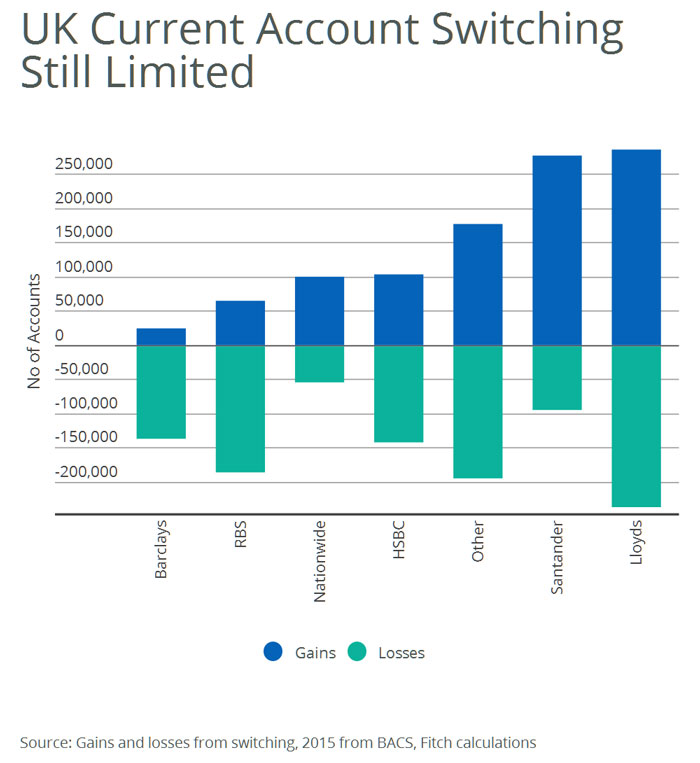The UK’s Competition and Markets Authority (CMA) has outlined a wide-ranging package of proposals to tackle the issues hindering competition in personal current accounts (PCA) and in banking services for small and medium-sized enterprises (SMEs). It includes new protections for overdraft users. They expect the package of remedies, taken together with ongoing technological developments, to result in significant changes to the operation and structure of retail banking markets in the UK.
At present, it is hard for bank customers to work out if they are getting good value. Bank charges are complicated and opaque and many customers think it is difficult and risky to change banks.
As a result, nearly 60% of personal customers have stayed with the same bank for over 10 years and over 90% of SMEs get their business loans from the bank where they have their current account.
This means that competitive pressures are weak, so banks do not need to work hard enough on price or quality of service.
The CMA considered whether the largest banks should be broken up but it came to the view that this would not address the fundamental competition problems. Having more and smaller banks, which customers still couldn’t easily choose between because of lack of transparency on fees and charges, would not significantly improve the market or give customers a better deal.
The CMA also considered whether to get rid of ‘free if in credit’ (FIIC) current accounts. Even though FIIC accounts are not really ‘free’, they do work well for many customers, and banning particular products would simply take away choice and risk the overall cost of accounts rising, not falling.
To transform the market the CMA believes banks instead need to be made to provide their customers with the right information so that they can easily find out which provider and type of account offers best value for them. The CMA also proposes to push the development of new online comparison tools and improve the current account switch service (CASS) to make switching banks more straightforward and give customers more awareness of, and confidence in, the process.
FIIC accounts are certainly not free for overdraft users, who represent nearly half of personal customers. The CMA’s proposals include new measures targeted at overdrafts, with a particular focus on users of unarranged overdrafts; in 2014, £1.2 billion of banks’ revenues came from unarranged overdraft charges.
The CMA proposes requiring banks to set a monthly maximum charge for unarranged overdrafts on personal current accounts. Customers may not even be aware of when they go into unarranged overdraft or realise the costs they are incurring, so the CMA also wants banks to alert people when they are going into unarranged overdraft, and give them time to avoid the charges.
Big technological changes are happening in banking, and the CMA wants to harness them to empower customers to compare and switch accounts. The CMA is proposing to require banks to move swiftly to introduce an Open API (application programming interface) banking standard. This standard will enable personal and SME customers to safely and securely share their unique transaction history with other banks and trusted third parties. This will enable bank customers to click on an app, for instance, and get comparisons tailored to their individual circumstances, directing them to the bank account which offers them the best deal.
The CMA also proposes that banks should be made to regularly prompt their customers to check that they are getting good value from their banking provider. When these prompts direct customers to digital comparison services which give tailored price-comparison and service quality advice, the foundation has been laid for a major change in the retail banking sector.
On these foundations, the CMA proposes to build a strong package of measures to deliver better banking services to SMEs. Making it easier for SMEs to shop around and open a new current account will reduce business owners’ reliance on their personal bank when choosing a bank for their business. By making the prices and availability of lending products more transparent, the majority of SMEs need not, as is the case now, turn directly to their existing bank for finance without considering other offers.
The package of changes could bring benefits to bank customers to the tune of £1 billion over 5 years.
Already, if personal customers switched to a cheaper product for them, annual savings could be on average £116; ranging from £89 on average for customers who do not use an overdraft, to £153 on average for overdraft users.
Alasdair Smith, Chair of the Retail Banking Investigation, said:
For too long, banks have been able to sit back and not work hard enough for their personal and small business customers. We believe the strong and innovative package of measures we are proposing will give customers the information and tools they really need to get a better deal out of the banks. They will also protect those who fall into overdraft from being stung with unexpected fees.
New entrants into a market are an important source of competition and innovation, and we are well aware of the current barriers to challenger banks in UK retail banking. What’s really holding them back is their ability to highlight to customers how new offerings compare with their current deal. Our package of banking reforms will help new competitors get a stronger foothold in a market which is of vital importance to the whole economy.
The CMA invites submissions in writing by 7 June. They will publish the final report in early August.




